5 Myths About Faithfulness
Do you ever wonder if you’re missing out on God’s blessings or not growing enough as a Christian because you’re not faithful enough? Or do you feel like you’ve carefully worked through a list of “must-dos” but you’re still stuck where you’re at?
We all struggle with faithfulness from time to time, but sometimes, we may be experiencing guilt about the wrong thing or feeling frustrated because our ideas of what faithfulness looks like aren’t playing out in our lives.
Here are five myths about faithfulness we may be holding on to:
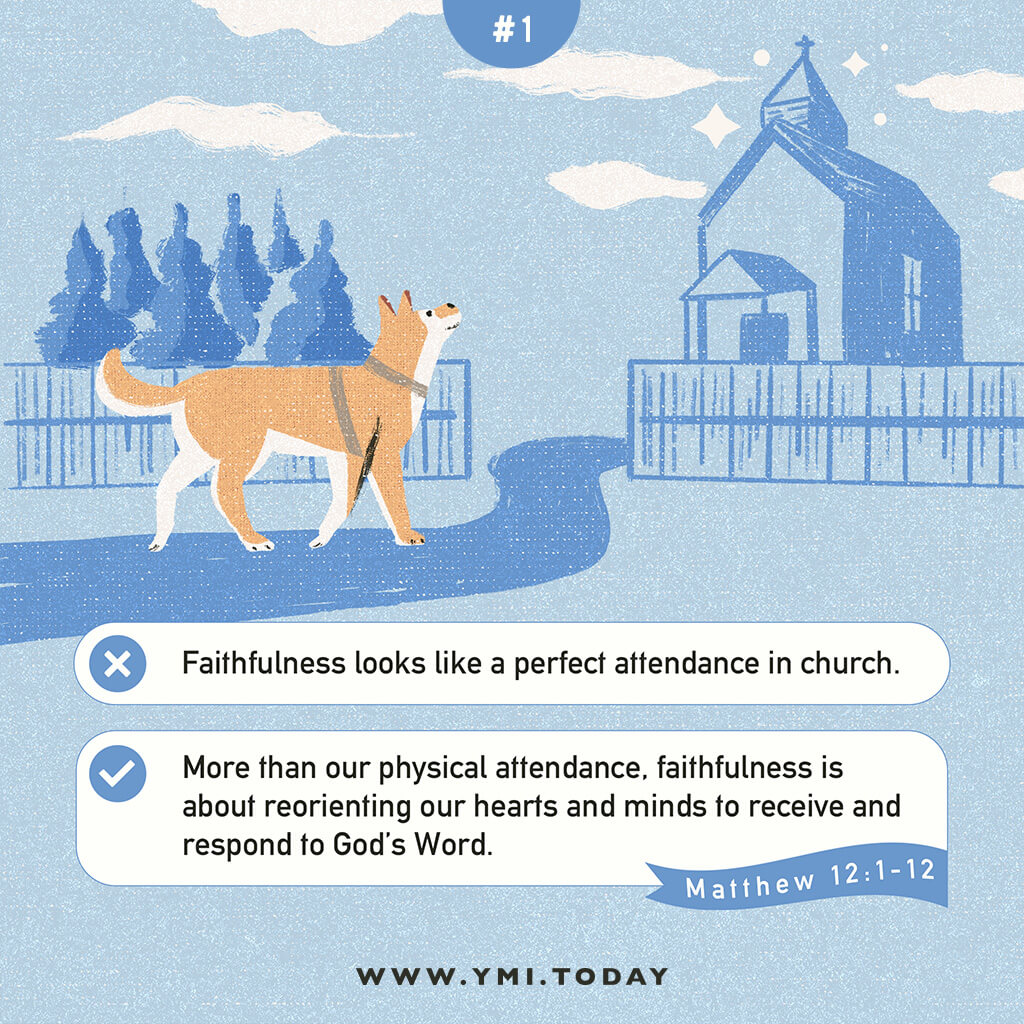
1. Faithfulness looks like a perfect attendance in church
A common measure of faithfulness we all subscribe to is whether we’re attending worship service or Bible study regularly. Sometimes this leads us to feel guilty when we miss a session or meeting because of work, a special event, or even if we’re feeling under the weather.
While God does command us to observe the Sabbath, this isn’t merely measured by a perfect church attendance (which is not to say that we don’t need to go anymore!). In fact, we all know we could be sitting in the service every Sunday with our minds wandering, worrying about the next task/meeting on our agenda instead of listening to the message.
More than our physical attendance, Sabbath—meaning rest—is about dedicating a specific time/day to worship God and rest in His presence (see Matthew 12:1-12). And faithfulness in this context is about intentionally reorienting our hearts and minds to receive and respond to God’s Word.
We can rest because we trust that God will take care of us, and because even God, who has no physical limitations, sees rest as good, which is why after creating the world, He took a day to rest and enjoy His creation (Genesis 2:2).
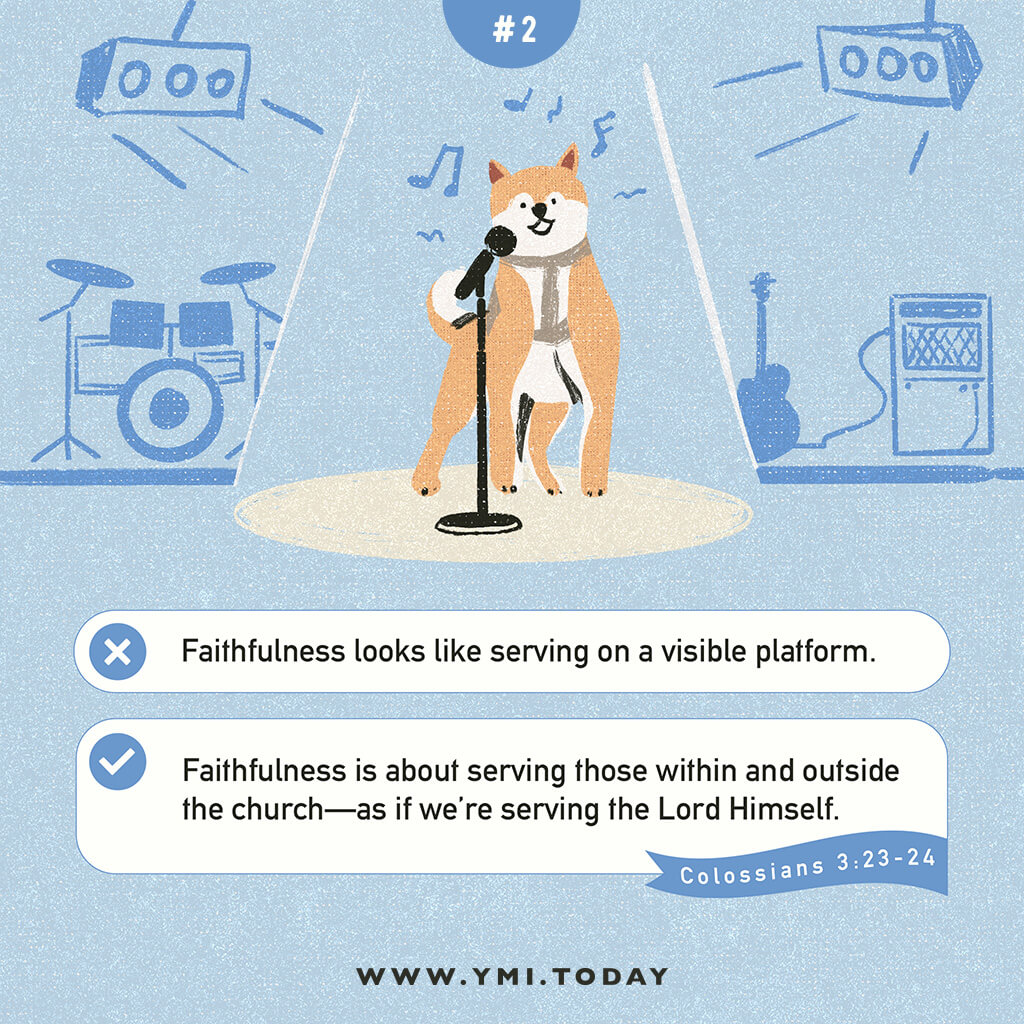
2. Faithfulness looks like serving on a visible platform
We often see our church leaders—pastors, liturgists, songleaders, deacons, ushers, etc.—as more than faithful than we are because their positions and responsibilities place them on a visible platform.
But God doesn’t measure faithfulness in the same way. Just think of the people Jesus called to be His disciples. Or the people Paul referred to in his letters. Not all of them were prominent names like Timothy or Titus, but there were many others we don’t often hear about—those who helped him deliver the messages and items he needed, prayed for him while he was in prison, and extended hospitality to him (see Philippians 2:25-30, 4:2-3; Colossians 4:7-17).
As Colossians 3:23-24 (ESV) says: “Whatever you do, work heartily, as for the Lord and not for men…You are serving the Lord Christ.” We can faithfully live that out by serving others within and outside of church—as if we’re serving the Lord Himself.
So even if we may not be serving on stage or as a leader in church, we can still express our faithfulness by staying up late to listen to another friend’s woes, helping a colleague with a task without expecting credit, or something as simple as stacking our plates and utensils after we finish a meal at the restaurant to make the cleaner’s job easier.
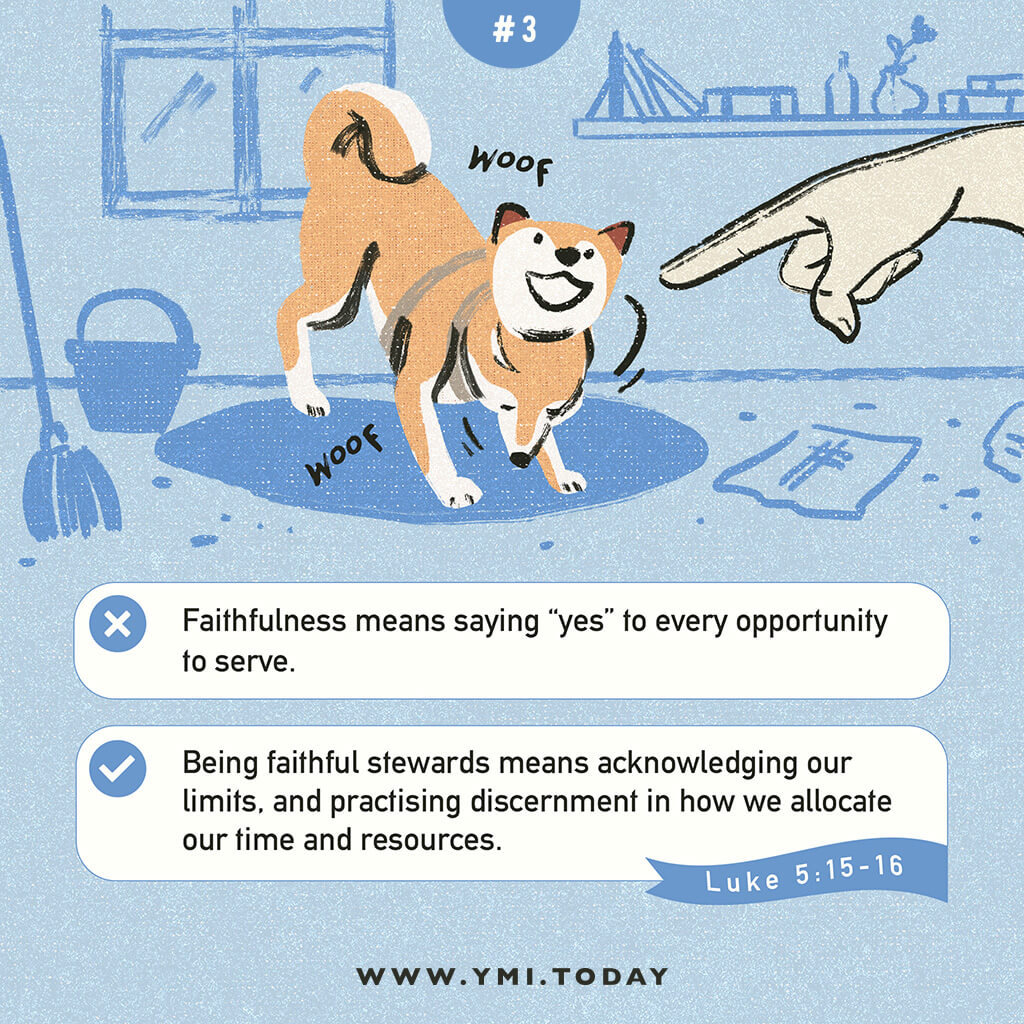
3. Faithfulness means saying “yes” to every opportunity to serve
Oftentimes we may feel compelled to serve because the need is clearly there, but it doesn’t mean that we can only say “yes” every time we’re asked.
Even Jesus Himself did not spend all of his waking hours actively ministering to people, but often withdrew from the crowd to pray (Luke 5:15-16).
Being faithful stewards of Christ means acknowledging that we have limits, and making allowances in our schedules for rest. Let’s practice discernment in how we allocate our time and resources, and examine our hearts to see the motivation behind our desire to serve.
Moreover, let’s also remember that God has placed us where we are to serve the people around us, and that includes our family, friends, and colleagues. If we volunteer to serve in church and then neglect these people in our lives, we’re not really being faithful to what we have been given.
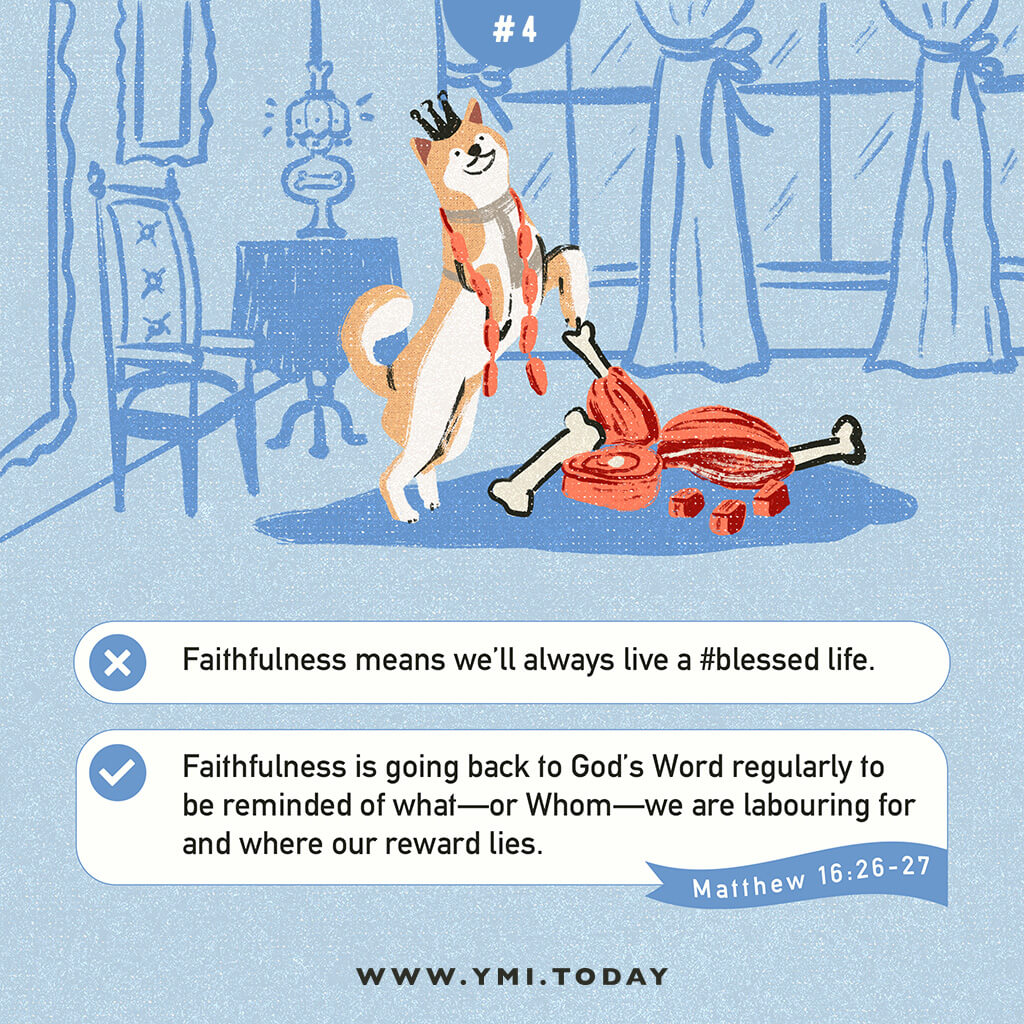
4. Faithfulness means we’ll always live a #blessed life
We live in a “results-oriented” world, so we often measure our efforts by the rewards we get—and when we don’t get the results we expect, we question the purpose of what we’re doing.
This can surface especially during times when we feel spiritually barren—we’re reading our Bible faithfully and praying every day, we’re doing everything we can to love and serve others, but our lives just don’t seem to be bearing fruit; or, we don’t seem to be getting the “blessings” we think we deserve: whether it’s a new job or a promotion, a boyfriend or girlfriend, or a life that’s shielded from pain and troubles.
In moments like these, when we pray and nothing happens, we may wonder, “Have I not proven myself to be faithful enough?”
To reorient ourselves, we need to go back to God’s Word regularly and be reminded of what—or Whom—we are labouring for and where our reward lies (Matthew 16:26-27). Even this prophecy about Jesus teaches us how to think of reward:
“I have labored in vain;
I have spent my strength for nothing at all.
Yet what is due me is in the Lord’s hand,
and my reward is with my God.” (Isaiah 49:4)
While we may not be rewarded for all the good we do in this lifetime, we can be sure that nothing we do goes unseen by God.
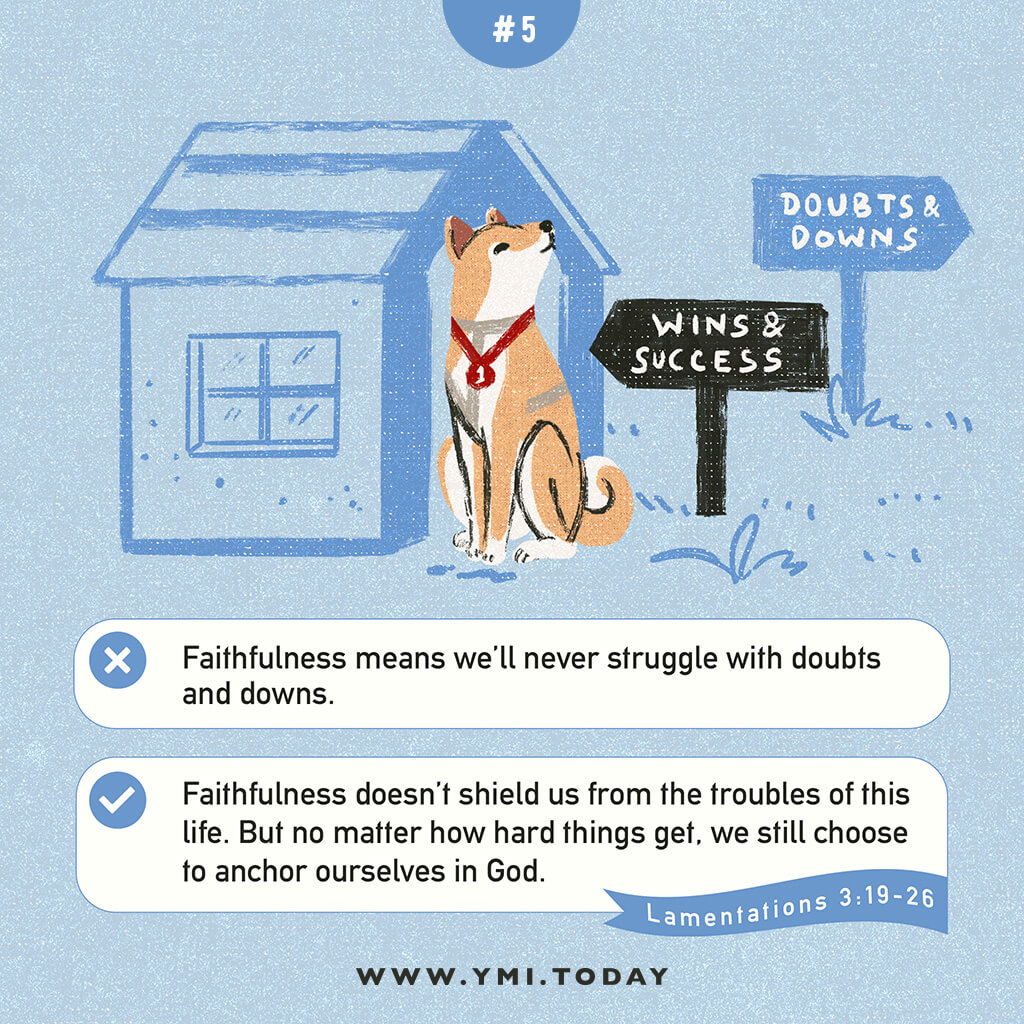
5. Faithfulness means we’ll never struggle with doubts and downs
When troubles do come our way, we could either begin to doubt God’s goodness (“Why did God allow this to happen?”) or question our own (“Did I do something wrong?” or “Am I not doing enough?”). On the other hand, when we hear of other people’s troubles, it can sometimes be instinctive to automatically respond with lines such as “be thankful”, “pray more,” “trust God,” etc. without really listening to their struggles and journeying with them.
Yet in the Bible we see many characters struggle with doubts and downs—Job, Elijah, Jeremiah, to name a few. They didn’t hurry through the process, nor did they try to downplay what they felt. But at the end of the day, they remain God’s faithful servants, because they still chose to surrender and submit to God (see Lamentations 3:19-26).
Being faithful doesn’t mean we cannot grieve over troubles or struggle with doubts. Being faithful means no matter how hard things get, when push comes to shove, we still decide to go back to God and say, “Lord, I believe what Your Word says about who You are, and even if I still don’t understand, I will trust You.”
Our faith journey is often not as straightforward as we would like it to be, and sometimes we do need to reevaluate what we’re doing to see if we’re on the right track. Thankfully, we have the Bible and the Holy Spirit as our guide, and we have the Church to support us as we all continue our faith journey together.
Looking for more content like this? Join our Telegram channel to receive our content on the go.












Thank you so much for enlightening me with this reading!